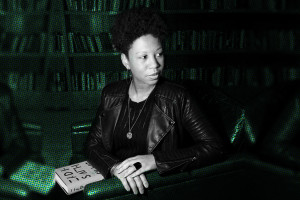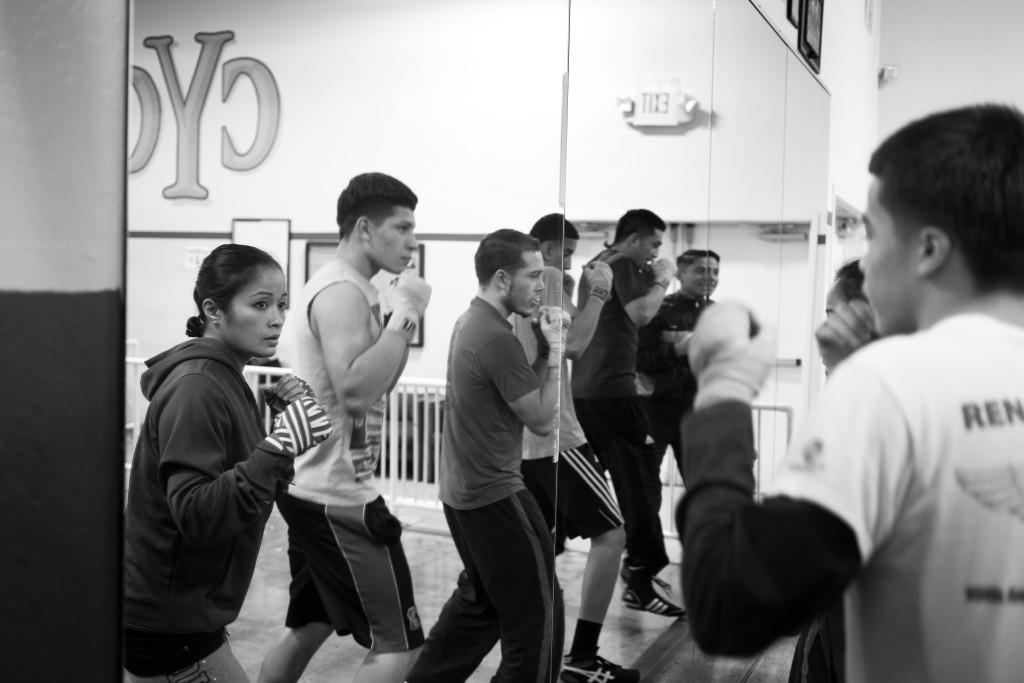Joan Didion on a 1965 murder trial, Vanessa Grigoriadis on rape culture, DREAMers making their voices heard, and social media’s destructive affirmation.
By Joanna R. Demkiewicz
Image by Erin Lefevre from “Fight Like A Woman“
I recently began a permanent relationship with The Paris Review’s first anthology under its imprint, “Women At Work,” a collection of interviews from the magazine spanning 1956 to 2016 and featuring such geniuses as Toni Morrison, Simone de Beauvoir and Margaret Atwood. The book stretches into 396 pages and is a luxurious escape into the minds, habits and workspaces of women writers who have contributed challenging and singular work to the literary canon.
The dialogues, as novelist Ottessa Moshfegh points out in her preface to the collection, become “stories of their own.” Reading them feels both pleasurable and like homework. But the feelings aren’t mutually exclusive—to me, anyway. Most writers find pleasure in the mundane aspects of writing—the “homework,” if you will—setting up the space, creating the desktop folder, nixing the wily commas. Journalists, especially, find satisfaction in the details.
The Riveter’s journalists—some regular, some one-time contributors—all have their own methods for turning around drafts, transcribing interviews, looking for another way to call something beautiful, or incomprehensible, or horrible. This year was all of those things, and our stories offered dynamic analyses of immigration, sexual assault, social media, art, the environment and more.
Read on for our most-read stories and interviews from 2017 (in no particular order, and with a few of my faves thrown in for good measure). Here’s wishing you more bold and illuminating storytelling in 2018.
The Power of Diversity in Office by Alyse Burnside
Moved by the number of women of color and Indigenous women that were elected into office in the U.S. in 2017, Alyse Burnside interviewed Andrea Jenkins (the first openly transgender black woman elected to public office), Mazahir Salih (the first Sudanese-American to hold elected office) and Jamescita Peshlakai (a Navajo woman of the Tangle People and Redhouse clans) for this story, which examines the impact these politicians hope to make.
In short: “Everybody now is talking about, ‘Hey, we need more minorities in leadership. We need more minorities on our school board, at our meetings.’ But before you ask for that: Raise the minimum wage so they can afford to work one job. Before you ask for that: Fix the transportation system so they can come.”
Fight Like A Woman by Erin Lefevre
Photojournalist Erin Lefevre follows boxer Casey Morton, who she first photographed during a training session at World Boxing Gym in San Francisco. A former motivational speaker for at-risk teens, Morton allowed Lefevre to follow her for a year as she pursued a professional career in boxing. Lefevre’s black-and-white photographs show Morton’s grit and tenacity as she undertakes a male-dominated sport.
In short: “There was once a man who went to a guru because he wanted to be great. The guru told the man to meet him at the beach the next day wearing shorts. The guru grabbed the man by the head and held him underwater until he almost passed out. He pulled the man out of the water and asked him what was the first word that came to his mind. The man replied “air.” The guru told the man the secret to greatness is wanting something more than he wanted air. That story kept playing through my mind because I want my dream more than I want the air I breathe.”
Q&A with Danielle Villasana, Photojournalist and Human Rights Advocate by Natasha Kallish

In an interview with photojournalist Danielle Villasana (whose photo essay “A Light Inside” is featured in our sixth print issue), Natasha Kallish dialogues about how compassion and attention go hand-in-hand when documenting the lives of transgender sex workers living in Peru. Their conversation illuminates the work of uplifting marginalized communities with integrity.
In short: “Thinking about the larger context of the transgender community, [the photo essay title] meant even more. Not only was this light a reflection of a desire to survive despite all these challenges, but it was this desire to be proud of their identity. You are who you are, and nobody can put that light out.”
Down With the Frats by Vanessa Grigoriadis
Excerpted from her incendiary exploration of sexual assault on campuses across the U.S., Down with the Frats takes on fraternity culture. Journalist Grigoriadis’ “Blurred Lines: Rethinking Sex, Power, and Consent on Campus” features candid interviews with college students, statistics from researchers and polarizing—but crucial—advice on what needs to happen to create safer environments on campuses. A bold investigation into misogyny and rape culture that everyone needs, this excerpt is chilling but required reading.
In short: “Universities benefit from the Greek system. It’s a tool for the recruitment of high-school boys; a strong emotional tie for contributing alumni, who can pull up at the house when they visit campus and crack beers on the front lawn; and, at a time of high anxiety over the legal liability of alcohol on campus and in dorms, the primary location of unsupervised drinking. The frats also remain a magnet for a valuable economic tier—students who pay near or full freight.”
Saving Irvington by Caitlin Dwyer
Interviewing her own neighbors in Portland, Ore., Caitlin Dwyer’s literary investigation of historical preservation methods and their connections to gentrification is a methodic analysis about how neighborhoods change and who benefits. She poses timely and universal questions about history, infrastructure and privilege. Tuck in with this one: We released it in two parts because of its length. By the story’s end, the reader feels as if they’ve been alongside Dwyer all along.
In short: “All of these stories are true, or perhaps none of them are. Telling the story of a neighborhood always involves some degree of nostalgia and invention, but in Irvington, nostalgia is a community pastime.”
Some Dreamers of the Golden Dream by Joan Didion

Excerpted from “The Stories We Tell,” an anthology of literary journalism by some of America’s best women journalists, Dreamers of the Golden Dream is Joan Didion at her most precise and absorbing. Analyzed in The New Yorker more than ten years ago, the magazine called the essay “an indictment of a false promise,” that is the “New California” promise of glittering ambition and success. The essay captures the infamous 1965 trial of Lucille Miller who was convicted of murdering her dentist husband. As with all of Didion’s work, its sweeping allegory is almost impossible to forget.
In short: “This is a story about love and death in the golden land, and begins with the country. The San Bernardino Valley lies only an hour east of Los Angeles by way of the San Bernadino Freeway but is in certain ways an alien place: not the coastal California of subtropical twilights and the soft wester-lies off the Pacific but a harsher California, haunted by the Mohave just beyond the mountains… There has been no rain since April. Every voice seems a scream. It is the season of suicide and divorce and prickly dread, wherever the wind blows.”
Waiting in Line: Undocumented Students Fight for Protection by Chantelle Bacigalupo
American-born Chantelle Bacigalupo was compelled to give voice to her friend Ana Maria, an undocumented DREAMer, along with organizations and student-led groups that are fighting conservative rhetoric and laws that seek to keep undocumented immigrants out. Privileging the voices of marginalized folks and the lawyers and professors that dedicate their lives to others’, Bacigalupo’s investigative longform story is a lesson in humanity.
In short: “I think what people need to ask is: Why are all these problems occurring in Latin American Countries? What role does the U.S. play in causing poverty, causing more violence, more war, that these countries’ people decide the best choice is to leave? They don’t have food. They don’t have work. People came to this country for a reason. There is history behind it that Americans don’t think about.”
The Body, Remembered by Rebekah Hall
A personal essay that calls out our culture’s insistence on social media affirmation—something we can all relate to—Rebekah Hall takes down Facebook’s memory feature. The platform’s algorithm-driven “good-intentioned” feature welcomes Hall back to a world where her body was different, smaller. Vulnerable and sharp, this is the essay of our time.
In short: “Social media has provided a platform that allows us to project our lives into the lives of others. We run our lives parallel to each other in an unprecedented show of curated experience. Our constant access to connectedness in turn simplifies the idiosyncrasies of our singular, very personal lives. We are comparing our performance of self to how other perform their identities. As a result, our self-gaze is redirected, often less toward the way we treat the people around us but instead focused on the nebulous way we are publicly perceived.”
Q&A with Well-Read Black Girl’s Glory Edim by Lianna Matt

Literary powerhouse and community organizer Glory Edim speaks frankly with Lianna Matt about all the ways in which publishing has failed women of color. Her movement Well-Read Black Girl—now a book festival—began with a t-shirt and, in more than two years, has garnered the attention of hundreds of thousands of women of color, including authors, whose books are too often pushed to the margins.
In short: “Being in a room together, there’s a sense of commonality that allows us to bond and connect with one another. Because there tends to be a lot of negative stereotypes when it comes to black women or people or color, I find it important to combat that by having positive examples and making the space very affirming and uplifting, transparent and vulnerable.”
Stewardship and Permaculture by Rita Kovtun
After spending time at California’s permaculture nonprofit Quail Springs, photographer Rita Kovtun returned to learn more about the community space, which offers classes on permaculture, sustainable living and natural building. Nestled in the watershed of Mt. Pinos and Mt. Abel and stretching across 450 acres of land, this photo essay captures the desire and creativity of those who wish to live with integrity.
In short: “At a time when the current U.S. administration vehemently denies climate change, announces intent to withdraw the country from the Paris Agreement, and, most recently, attempts to police the work of nonpartisan academics to remove references to phrases like ‘global warming’ in their world, the need for earth care, people care, and fair share is more crucial than ever before.”

Joanna R. Demkiewicz is a co-founder and the editorial director of The Riveter. She works as a book publicist for Milkweed Editions, an independent press in Minneapolis. Her writing can be found in Guernica and Femsplain. Follow her on Instagram @yannademkiewicz and Twitter @yanna_dem.




